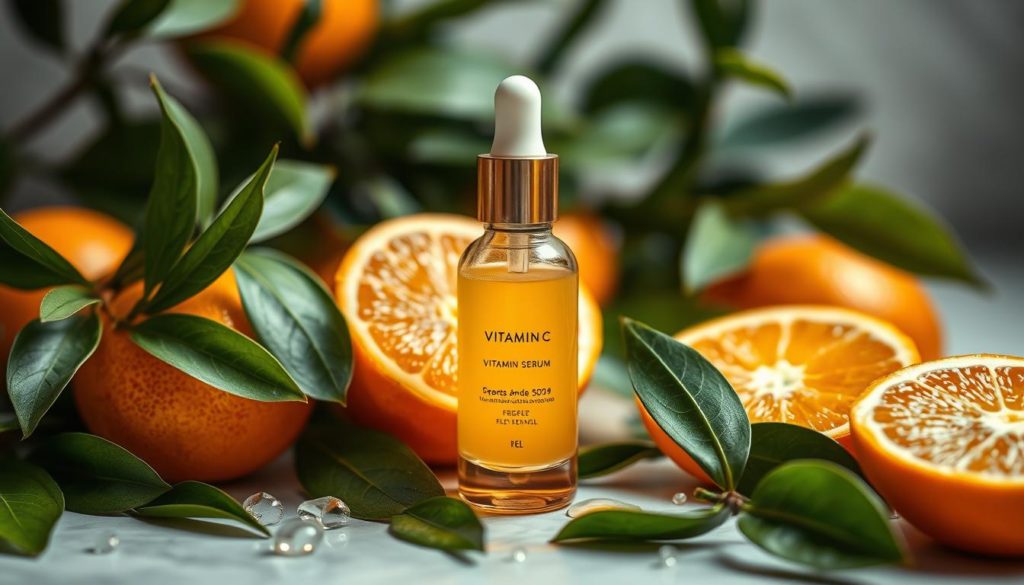Start your journey to radiant skin with Vitamin C essentials. This amazing nutrient is full of benefits for your skin. It helps you get that bright, glowing look you’ve always wanted.
Discover how Vitamin C can make your skin brighter and protect it from aging. It’s a game-changer for your skin health.
If you’re new to skincare or want to improve your routine, learn about Vitamin C. It’s a skincare superhero that can make your skin look amazing.
Get ready to say goodbye to dull skin and hello to a brighter, younger look. Let’s make your skincare routine better with Vitamin C and show off your best self.
The Power of Vitamin C in Skin Care
Vitamin C is a superstar in skin care, known for its antioxidant properties. It protects the skin from damage caused by the environment. This nutrient is key for health and looks, thanks to Vitamin C serum. The Clinical, Cosmetic and Investigational Dermatology Journal shows Vitamin C’s strength in fighting free radicals.

The American Academy of Dermatology says Vitamin C serum can brighten dull skin. It also stops damage that leads to aging signs. Dermatology and Therapy research shows Vitamin C serums can lessen fine lines and wrinkles. This supports Vitamin C’s role in keeping skin young and strong.
- Neutralizing Free Radicals: Vitamin C’s antioxidant properties combat free radicals, a primary factor in the aging process.
- Brightening Skin Tone: Vitamin C serums can reduce dullness, giving the skin a vibrant, healthy glow.
- Reduction of Signs of Aging: Promotes a smoother complexion by minimizing the appearance of fine lines and wrinkles.
Adding Vitamin C to your skincare routine can greatly improve your skin’s health and look. Whether in serums or creams, Vitamin C is a must-have for a glowing, youthful face.
Exploring the Benefits of Vitamin C for the Skin
Vitamin C is key for your health and a bright, young look. It’s famous for boosting collagen, treating dark spots, and fighting environmental stress. Let’s see how Vitamin C can change your skin for the better.
Boosting Collagen Production for Firm Skin
Collagen is vital for firm, young skin. Vitamin C helps a lot with this. A study in the Nutrients Journal shows Vitamin C is needed for collagen making. It keeps skin elastic and reduces wrinkles, making skin look smoother and younger.
Fading Hyperpigmentation and Dark Spots
Vitamin C is great for lightening dark spots. The Journal of Clinical and Aesthetic Dermatology says Vitamin C stops melanin, which causes dark spots. Using Vitamin C regularly can make your skin tone even and reduce dark spots.
Protecting Skin from Environmental Stressors
Vitamin C is a strong antioxidant that shields your skin from harm. The International Journal of Cosmetic Science found Vitamin C fights off free radicals and UV damage. It keeps your skin healthy and glowing.

In short, adding Vitamin C to your skincare is a smart move. It helps with collagen, fights dark spots, and protects against pollution. Vitamin C is a powerful tool for beautiful, healthy skin.
Natural Vitamin C Sources for Your Skin
Knowing the best natural sources of Vitamin C can boost your diet. It helps keep your skin looking young and radiant. Adding Vitamin C foods to your meals gives you this key nutrient from its strongest sources.
Fruits and vegetables are top dietary Vitamin C providers. They’re not just full of Vitamin C. They also have other nutrients that help your skin stay healthy and look good.
- Oranges – Known for their high Vitamin C content, improving skin texture.
- Strawberries – Rich in antioxidants and Vitamin C, helping repair and refresh the skin.
- Kale – Provides Vitamin C and vitamins A and K, important for skin flexibility and health.
- Peppers – Both red and green peppers have lots of Vitamin C.
It’s not just about any fruit or vegetable. Choosing natural sources of Vitamin C means you get the best form of this nutrient. The British Journal of Nutrition says Vitamin C from fresh fruits and vegetables is better than supplements. It’s easier for the body to absorb.
| Food Item | Vitamin C Content (mg per 100g) |
|---|---|
| Oranges | 53.2 |
| Strawberries | 58.8 |
| Kale | 120 |
| Red Peppers | 190.3 |
Nutrition Reviews shows eating foods rich in Vitamin C can make your skin look better. This shows how important it is to eat a diet rich in natural dietary Vitamin C. It helps not just your skin but also protects your cells.
How to Integrate Vitamin C into Your Daily Skin Routine
Adding an effective Vitamin C serum to your daily skincare can change your skin’s health and look. Vitamin C brightens and fights aging, making it key for young, glowing skin. Here’s a simple guide to using Vitamin C in your skincare routine.
Choosing the Right Vitamin C Serum
When picking a Vitamin C serum, look for stable Vitamin C forms. The International Journal of Dermatology says L-ascorbic acid is best, but it needs a pH under 3.5 for skin absorption. Also, choose serums with antioxidants like Vitamin E or ferulic acid to boost Vitamin C’s power.
The Best Time to Apply Vitamin C for Maximum Effect
The Journal of Clinical and Aesthetic Dermatology advises using Vitamin C serums in the morning. This helps protect your skin from UV rays and pollution. Clean your skin well before applying and let the serum soak in before adding more products.
Layering Skincare Products with Vitamin C
Layering skincare with Vitamin C means applying products in the right order. Start with the Vitamin C serum, then moisturizer, and finish with sunscreen. This way, each product works well without blocking others.
By following these tips, Vitamin C becomes a vital part of your skincare. It helps your skin look healthier and more radiant. Remember, sticking to your skincare routine is important, even with powerful ingredients like Vitamin C.
Understanding Vitamin C Concentrations and Formulations
In the world of skincare, the success of a product depends on its details. Vitamin C formulations come in different types, each with its own benefits and challenges. This section will look at the key points of Vitamin C concentration and how it affects the power and results of topical Vitamin C products.
Vitamin C levels vary for different skin needs. Lower amounts are good for sensitive skin, providing antioxidants without irritation. On the other hand, higher levels in serums and creams tackle issues like age spots and wrinkles more intensely.
Creating topical Vitamin C products is tricky. Vitamin C loses its potency quickly when exposed to air and light. It needs special packaging and stabilization methods. Look for products in airtight, opaque containers to keep them effective longer.
- Stability: Choose products with ascorbic acid, Vitamin E, and ferulic acid for better stability.
- Formulation Type: L-ascorbic acid is very potent but unstable. Magnesium ascorbyl phosphate or tetrahexyldecyl ascorbate are more stable and offer similar benefits.
- Skin Type Matching: Pick a Vitamin C product that fits your skin type. Higher concentrations can be too harsh for sensitive skin.
Knowing how Vitamin C formulations and their concentrations impact skincare can help users make better choices. This way, they can find products that meet their skin’s specific needs.
Vitamin C and Your Immune System: A Dual Benefit
Vitamin C is known for making your skin look great. But it does more than that. It helps keep your body healthy, as studies from the British Journal of Nutrition show. This vitamin is key for your overall health, not just your looks.
Strengthening Your Body’s Defenses
Adding Vitamin C to your diet can make your immune system stronger. A study in the European Journal of Clinical Nutrition found that Vitamin C helps your immune cells work better. It also lowers the chance of getting sick, making it a vital part of staying healthy.
Vitamin C’s Role in Holistic Health
Vitamin C does more than just boost your immune system. It helps with many body functions, from metabolism to mood, as Nutrition studies show. Its antioxidant powers fight stress in your body, not just your skin. This helps you stay healthy inside and out.
Recognizing and Addressing Vitamin C Deficiency
It’s important to know how to spot and fix Vitamin C deficiency to stay healthy. This part talks about the symptoms of deficiency and how to eat right to correct Vitamin C levels.
Identifying Symptoms of Insufficient Vitamin C Intake
Spotting the signs of too little Vitamin C can stop bigger health problems. The main symptoms of deficiency are:
- Fatigue and weakness
- Easy bruising and slow healing wounds
- Dry, splitting hair and rough, bumpy skin
- Bleeding gums and weakened tooth enamel
- Decreased ability to fight off infections
If you see a few of these signs, it’s time to check your Vitamin C intake.
Diet Adjustments to Correct Vitamin C Levels
Changing your diet is a smart way to correct Vitamin C levels. Here are some foods to add:
- Citrus fruits like oranges and grapefruits
- Strawberries, kiwi, and papaya
- Bell peppers and broccoli
- Dark leafy greens such as spinach and kale
- Tomatoes and peas
Eating these foods often can help fix Vitamin C deficiency and improve your health.
Fixing a Vitamin C shortage is more than just spotting symptoms of deficiency. It’s also about making food choices to correct Vitamin C levels. With the right diet, you can beat Vitamin C deficiency and get healthier.
Vitamin C Supplements vs. Natural Foods: What’s Best for Skin Health?
The debate on whether to choose Vitamin C supplements or natural foods for better skin health is important. Research from Pharmacy and Therapeutics, Dermatology and Therapy, and The Journal of Nutritional Biochemistry sheds light on this topic. Each study offers insights into how these sources impact skin health.
Vitamin C tablets provide a convenient way to get Vitamin C, often in higher amounts than in food. But, the body’s ability to absorb synthetic Vitamin C can be a topic of discussion. This raises questions about its effectiveness compared to natural sources.
- Natural Sources: Foods like oranges, kiwis, and strawberries are full of Vitamin C. They also offer antioxidants that help skin health.
- Vitamin C Supplements: These are great when you don’t get enough Vitamin C from food. They offer a precise amount for specific skin health needs.
Natural foods offer more than just Vitamin C. They also provide fiber and other nutrients not found in Vitamin C supplements. Yet, supplements are appealing for their convenience and direct Vitamin C delivery. They are good for those who don’t eat enough Vitamin C-rich foods.
Choosing the right approach depends on your diet, health, and lifestyle. Combining Vitamin C-rich foods with supplements might be the best way to achieve optimal skin health and overall well-being.
Establishing Your Personal Vitamin C Daily Intake
Finding the right amount of Vitamin C for you is not simple. Your age, lifestyle, and what you eat matter a lot. Most adults need 75 to 120 milligrams of Vitamin C each day. But, if you want to protect your skin from the environment, you might need more.
It’s key to find a balance that helps your overall health and your skin. Talking to a healthcare expert can help you figure out what’s best for you.
Eating foods rich in Vitamin C is a great way to get what you need. Oranges, lemons, bell peppers, kale, and broccoli are all good sources. If you want more, skincare products with Vitamin C can help.
Using both food and skincare products together can work even better. This way, you help your skin produce collagen, brighten your skin, and reduce inflammation.
Remember, your skin is unique, just like you. Always check if you’re getting enough Vitamin C. You can get it from food, supplements, or both. Finding the right amount is important for your skin and health.
By taking care of your vitamin intake, you can keep your skin glowing and your health strong. It’s all about finding what works best for you.
FAQ
What are the key benefits of Vitamin C for the skin?
Vitamin C fights free radicals, which helps prevent early aging. It makes your skin glow, boosts collagen for firmer skin, and reduces dark spots. It also protects against UV rays and pollution.
Can Vitamin C improve collagen production and how does it affect the skin’s firmness?
Absolutely. Vitamin C is key for making collagen, keeping your skin elastic and firm. More collagen means your skin looks younger and more supple.
What foods are rich in Vitamin C?
Many tasty foods are full of Vitamin C! Oranges, grapefruits, strawberries, kiwi, and bell peppers are great choices. Kale, broccoli, and Brussels sprouts are also good sources. Eating these can help your skin and health.
How do I choose the right Vitamin C serum for my skin?
Look for a Vitamin C serum that’s stable and has the right concentration for your skin. Make sure it has a pH level that works well. Adding Vitamin E and ferulic acid can make it even better. Always test new products on a small area first.
What is the best time to apply Vitamin C for maximum benefit?
Apply Vitamin C serum in the morning to protect your skin all day. But, you can also use it at night if you’re using other products that might make your skin more sensitive to sunlight.
How can I integrate Vitamin C into my skincare layering routine?
Start with a clean face and apply Vitamin C serum first. Its low pH helps it absorb better. Wait a bit, then apply moisturizer and sunscreen to lock in the benefits. Be careful using it with products like retinoids or AHAs to avoid irritation.
Are there different concentrations of Vitamin C, and what should I use?
Yes, Vitamin C products range from 5% to 20%. Start with a lower concentration if you’re new or have sensitive skin. Higher concentrations are more effective but can be riskier.
How does Vitamin C support the immune system?
Vitamin C helps the immune system by boosting white blood cell production. It fights infections and reduces inflammation, keeping you healthy.
How can I recognize a Vitamin C deficiency, and what should I do about it?
Signs of Vitamin C deficiency include fatigue, muscle weakness, and joint pain. You might also notice bruising, dry skin, and slow healing. Eat more Vitamin C-rich foods and talk to a doctor about supplements if needed.
Are Vitamin C supplements as effective for skin health as natural foods?
Both supplements and foods can provide Vitamin C for your skin. Foods offer more nutrients and fiber for overall health. Supplements are good when you can’t get enough from food, but they should not replace a balanced diet.


